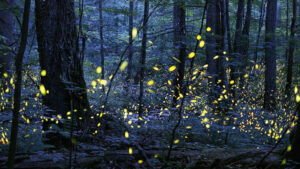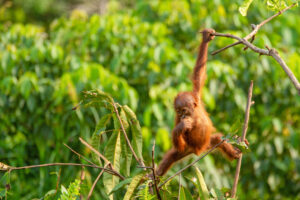About a lifetime ago, I worked on a trail construction crew in the Adirondacks of upstate New York. If you know anything about the ‘dacks, you know that mosquitoes, in their sheer number, are among its most mythic attributes.
The bugs were everywhere; they were inescapable. Especially, I started to realize, for those among my cohort who tended to shower more often. (Suffice it to say, I stayed pretty “nature-y” back then.)
Turns out I was onto something — at least this time.
A new study suggests that soaps that use sugars (even natural ones) for fragrances can attract mosquitoes. That’s because the world’s deadliest animals also sip on plant nectars to boost their sugar intake.
Imbue a huge, thin-skinned sack of coursing blood with sugary, flowery scent? To a mosquito, there’s few things more delicious.
“The fact we are taking those flowery, fruity smells and putting them on our bodies means that now the same object smells like a flower and a person at the same time,” Clement Vinauger, who led the research at Virginia Polytechnic Institute and State University, told The Guardian. “It would be like waking up and smelling something that was like both coffee and muffins. Very appealing.”
No magic bullet
Make no mistake — the finding does not amount to a 1:1 equation. Variables of human physiology from individual to individual play a huge role in mosquito attraction. So do the habits of female mosquitos (the blood-sucking ones).
Because female mosquitoes spend their lives alternately hunting plant sugars and animal blood, researchers have posited that encountering an organism that smelled like both could confuse them.
Baldwyn Torto, a chemical ecologist and mosquito expert at the International Centre of Insect Physiology and Ecology, told The Atlantic the effect can be like “seeing an organism that doesn’t exist.”
But as the Virginia Polytechnic study indicates, that’s not the whole story. In it, co-authors Morgen VanderGiessen and Anaïs Tallon collected chemicals from volunteers’ arms. They scrubbed one arm with soap, and left the other left alone. Then, they placed the samples in range of a group of mosquitos and watched.
It puts the coconut on its skin?
One coconut-and-vanilla-scented body wash made by Native generally hampered the bugs’ feeding — which could be partly due to coconut’s natural repellent effect on many insects.
But three other soaps made by Dove, Dial, and Simple Truth spurred relative feeding frenzies among many volunteers. That was the case even though every soap in the study contained a high dose of limonene, according to The Atlantic.
The upshot? Not only is it a mosquito attractant double-whammy to add flowery, sugary scents to your skin — scented soaps will also react differently on different skin, in terms of their olfactory output.
On the other hand, coconut looks like a safe bet for most people.
(That or, on primary advice — a good, thick layer of campfire soot and Adirondack dirt.)






